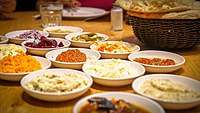Ma'amoul
Ma'amoul (Arabic: معمول [mɑʕmuːl] (![]()
 | |
| Type | Dessert |
|---|---|
| Region or state | Saudi Arabia, Jordan, Israel, Lebanon, Palestine, Syria, and throughout the Arab world |
| Main ingredients | Semolina, dates, pistachios or walnuts |
Ma'amoul are usually made a few days before Christmas, Easter, or Eid, then stored to be served with Arabic coffee and chocolate to guests who come during the holiday.[1][6] It is popular throughout the Arab world,[7] especially in the Arabian peninsula.[8]
Etymology
The Arabic word Ma'amoul (Arabic: معمول) is derived from the Arabic verb Arabic: 'amala, meaning to “to do”.[9]
Popularity
Many households keep a stock of them all year round, but they are notably consumed during religious festivals.
- Muslims eat them at night during Ramadan and on the Eid al-Fitr and Eid al-Adha holidays,
- Arab Christians and Greeks eat them in the days before Lent, on Easter Sunday and on the feast of Epiphany. In the Christian traditions of the Mediterranean area, the cookies are marked with a cross, or shaped into circular rings (like an “O”) to symbolize the crown of Jesus.
- They are also popular among Syrian, Lebanese and Egyptian Jewish communities, where ma'amoul with nut fillings are eaten on Purim, and ma'amoul with date fillings are eaten on Rosh Hashanah and Hanukkah. The Levantine Jewish version of ma'amoul differs from the Levantine or Turkish versions by being made with pure white flour and no semolina, today this variation is eaten in Syrian and Egyptian Jewish communities in the Diaspora.
Karabij
A more elaborate version known as Karabij (Kerebiç in Turkish) is used on special occasions. For this, nut-filled ma'amoul balls are stacked in a pyramid and served with a white cream called Naatiffe made from egg whites, sugar syrup and soapwort (Saponaria officinalis). It is popular in Syria, Lebanon, and other Levantine countries.
See also
- Kleicha
- Kolompeh
- Koloocheh
- Makmur
- List of pastries
- List of shortbread biscuits and cookies

| Wikibooks Cookbook has a recipe/module on |
References
- "Maamoul: An Ancient Cookie That Ushers In Easter And Eid In The Middle East". NPR.org. Retrieved 2017-11-10.
- "Maamoul Is Date Filled Arabian Cookies - Munaty Cooking". Munaty Cooking. 2017-01-17. Retrieved 2017-11-10.
- "Maamoul: Middle Eastern pistachio filled pastries". May I Have That Recipe. 8 May 2013.
- "Maamoul (ma'-mul) Dates". www.libanaissweets.com. Retrieved 2017-11-11.
- Rahayel, Anthony (2014-02-02). "Safsouf's Maamoul Madd bi Ashta: Back to Authenticity... :: NoGarlicNoOnions: Restaurant, Food, and Travel Stories/Reviews - Lebanon". NoGarlicNoOnions. Retrieved 2017-11-11.
- "Maamoul: The Sweet Tradition of Eid". The Irresistible Magazine by Al Rifai. 7 September 2016.
- Obayda, Gloria. Sweets And Desserts Of The Middle East. 101 Middle Eastern Delights.
- "At the Immigrant's Table: Jewish ma'amoul pie". At the Immigrant's Table. 3 February 2014.
- Team, Almaany. "Definition and meaning of the verb in Arabic language - Arabic dictionary - Page 1". www.almaany.com.
| Wikimedia Commons has media related to Ma'amoul. |
- Farah, Madelain, Lebanese Cuisine: More than 200 Simple, Delicious, Authentic Recipes: London: 2001 ISBN 978-1-56858-179-8
- Smouha, Patricia, Middle Eastern Cooking, London 1955 ASIN: B0000CJAHX
- Roden, Claudia, A New Book of Middle Eastern Food: London 1986 ISBN 0-14-046588-X
- Roden, Claudia, The Book of Jewish Food: New York 1997, London 1999 ISBN 0-14-046609-6
- Uvezian, Sonia, Recipes and Remembrances from an Eastern Mediterranean Kitchen: A Culinary Journey Through Syria, Lebanon, and Jordan: 2004 ISBN 0-9709716-8-0, ISBN 978-0-9709716-8-5
- Joan Nathan, The Jewish Holiday Kitchen: New York 1988 ISBN 0-8052-0900-X
- Joan Nathan's Jewish Holiday Cookbook: 2004 ISBN 0-8052-4217-1, ISBN 978-0-8052-4217-1
- "Maamoul – Traditional Middle Eastern Cookies". www.libanaissweets.com. Retrieved 10 November 2015.
